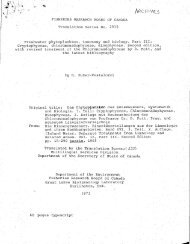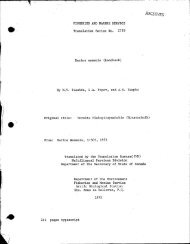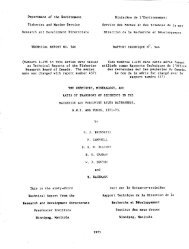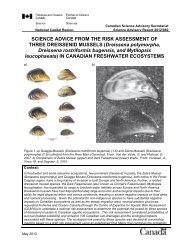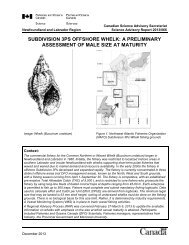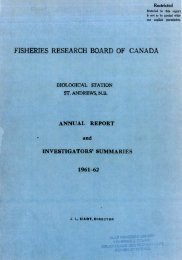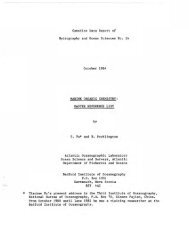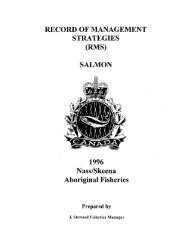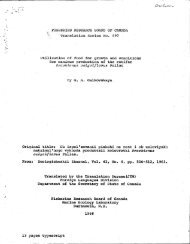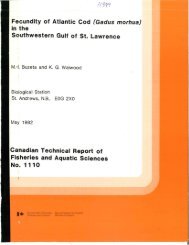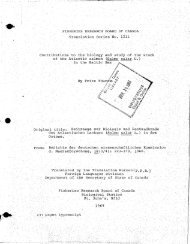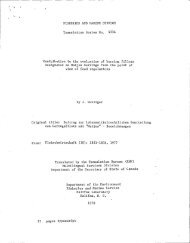Create successful ePaper yourself
Turn your PDF publications into a flip-book with our unique Google optimized e-Paper software.
249<br />
I arrived at Naas Harbor on steamer "Boscovitz" on the 4th day of May, and<br />
found Mr. McLennen busily eugaged in refitting the cannery premises which he<br />
had recently parchased, and extending the wharf, where steamers can now land,<br />
and secure cargo, at all stages of the tide. New premises were also in course of<br />
erection for a salmon saltery for Mr Hall of Port Simpson. After having issued<br />
licenses for the number of boats which these establishments expeóted to employ, and<br />
made enquiries in reference to the persons likely to engage in sal mon fishing on<br />
their own account, and also, in regard to the coolachan fishery and the difThrent tribes<br />
of Indians that participated therein during the last seasons' fishing, I left the Nasa<br />
in my boat for the Skeena, which I reached via Port Simpson and Metlakalta on<br />
the 11th of May. I there found the managers of the different canneries busily pro—<br />
paring for the season's work, and also preparing to repeat the mistakes of former<br />
years, by commencing operations at too early a date. A simultaneous commence-.<br />
ment was made on the 21st of May, and it was after the 10th of June before the catch<br />
was remunerative, between which date a large number of magnificent fish had been<br />
caught at a heavy loss to all concerned.<br />
During the whole season Indian salmon was scarce and fishing less satisfactory than<br />
in former years, the scarcity was owing to the fact of so many of the Indians I rorn<br />
Metlakatta,—who were the most skilful fishermon—having joined Mr. Duncan's<br />
colony in Alaska, it was less satisfactory, as the place of the former had to be<br />
supplied by 1:ndians fiom a great number of tribes, many of them from the forks of<br />
the Skeena, tribesmen of those who were concerned in the trouble that unfortunately<br />
occurred in that vicinity last summer. Such being the case it is not surprising that<br />
quarrels occasionally took place amongst them, resulting from their interfering<br />
with each other when fishing, and various other causes and which threatened at<br />
times to beeome serious. However by being constantly amngst them, and advising<br />
them, all serious trouble was averted, although the will rumors and exaggerated<br />
reports which were constantly being circulated from the scone of the trouble on the<br />
Skeena kept them in a state of excitement and unrest.<br />
The only serious difficulty which I had in enforcing the Fisheries Act was with<br />
the Indians of Kit-Sap. In regard to that, you are well informed from my letter and<br />
from information gained during your visit to the Skeena last summer.<br />
I am convinced that a difficulty will not occur again in the Name form, or of<br />
such formidable proportions, but that more or less salmon will be caught by Indiana<br />
in remote places, and sold to their friends who are fishing on c )ntract, who will land<br />
them at the canneries as their own catch, I have not the least doubt.<br />
Fishing on the Skeena is very destructive to nets owing to the number of sunken,<br />
and half sunken logs and trees in the river, and I think that those who are engaged<br />
in this important industry are entitlod to the consideration of the Government, and<br />
that suitable means should be taken to secure them from the large nauaI loss tG<br />
which they are subjected.<br />
I visited the Naas River again on the 24th of July, when I issued a few incro<br />
licenses. There was a good run of salmon, but a scarcity of fishermen.<br />
When at Naas Harbor I received a letter from the chief of the Indian village<br />
at Kincolith, near the entrance of the Ntsas River, requesting me to oall at his<br />
village as he has something of importance to communicate. I landed there on my<br />
way back, and found the chief and a number of the principal men of the village<br />
assembled in the chief's house. They asked many questions about the law in regard<br />
to catching salmon on the Naas River; wanted to know exactly how much moneyL<br />
had collected this year, and what I had done with it. After being a itisfieci on theses<br />
points, the chief very gravely informed me that I had done very wrong in collecting<br />
money for fishing on the Naas, without having asked permission from him, that the<br />
river belonged to him and to his people, that it was right that white men should<br />
buy licenses, but that he and his people should receive the money, that they were<br />
entitled to it all; but that as I had been sent to collect it, they were willing that I<br />
should retain half for my trouble. After a consultation amongst themselves, I was<br />
told that they had intended to demand half the money collected this year, but would



